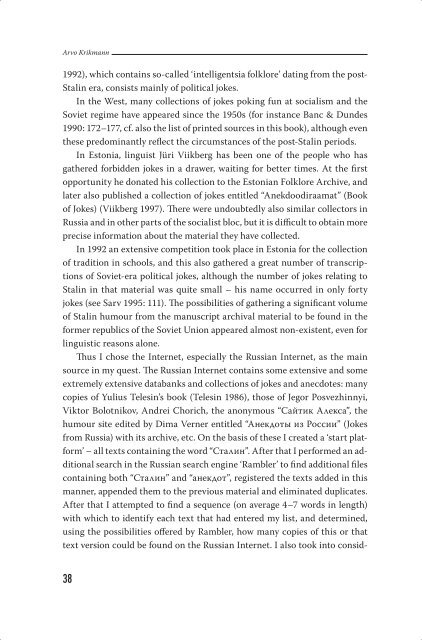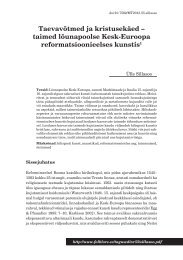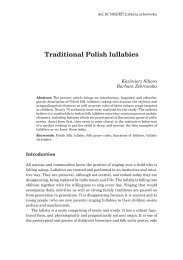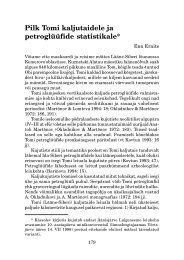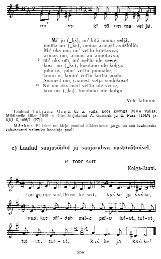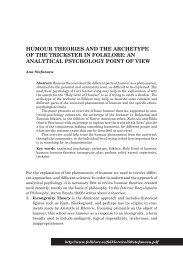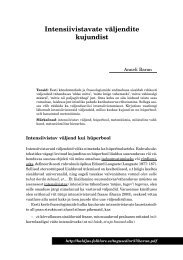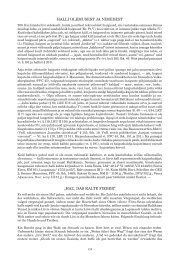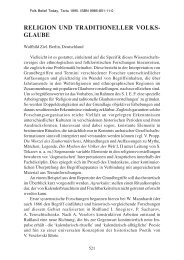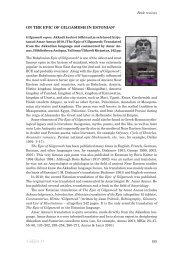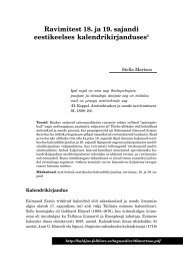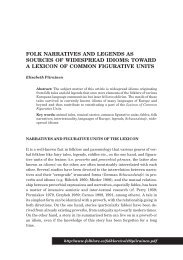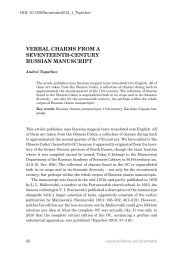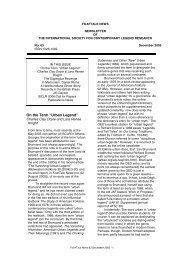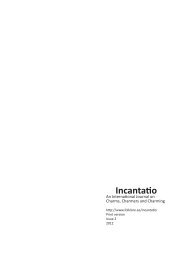- Page 1 and 2: NETINALJU STALINIST « « INTERNET
- Page 3 and 4: Составитель и реда
- Page 5 and 6: KOOSTAJALT See raamat on sündinud
- Page 7 and 8: Koostajalt sades vastavalt vajaduse
- Page 9 and 10: Koostajalt Žanrisuhteid ja stereot
- Page 11 and 12: Koostajalt teised püksid kaasa, ku
- Page 13 and 14: Koostajalt (nr. 112). Armeenia Raad
- Page 15 and 16: Koostajalt eluohtlikke seiku nende
- Page 17 and 18: Koostajalt tegelaseks vaid erandjuh
- Page 19 and 20: Koostajalt 2. Ka värsivormis osad
- Page 21 and 22: Oт составителя Боре
- Page 23 and 24: Oт составителя Об у
- Page 25 and 26: Oт составителя расс
- Page 27 and 28: Oт составителя ками
- Page 29 and 30: Oт составителя еще
- Page 31 and 32: Oт составителя 4. Ан
- Page 33 and 34: Oт составителя За к
- Page 35 and 36: Oт составителя неме
- Page 37: EDITOR’S PREFACE is book is the p
- Page 41 and 42: Editor’s preface and over again,
- Page 43 and 44: Editor’s preface is possible to d
- Page 45 and 46: Editor’s preface to Winston Churc
- Page 47 and 48: Editor’s preface (b) Roosevelt, C
- Page 49 and 50: Editor’s preface repressions of t
- Page 51 and 52: Editor’s preface and diverse, and
- Page 53: Viited Viited ||| Литерату
- Page 57 and 58: Netinalju Stalinist RUS+EST+FIN+ENG
- Page 59 and 60: Netinalju Stalinist Голос Во
- Page 61 and 62: Netinalju Stalinist table, shaking
- Page 63 and 64: Netinalju Stalinist предпол
- Page 65 and 66: Netinalju Stalinist 50 syyllistä j
- Page 67 and 68: Netinalju Stalinist orders Khrusche
- Page 69 and 70: Netinalju Stalinist « ere is an ol
- Page 71 and 72: Netinalju Stalinist (Marxismus-Leni
- Page 73 and 74: Netinalju Stalinist lect jokes abou
- Page 75 and 76: Netinalju Stalinist « Yasser Arafa
- Page 77 and 78: Netinalju Stalinist to investigate
- Page 79 and 80: Netinalju Stalinist « Die deutsche
- Page 81 and 82: Netinalju Stalinist « Die deutsche
- Page 83 and 84: Netinalju Stalinist kušajut.” -
- Page 85 and 86: Netinalju Stalinist Roten Platz sit
- Page 87 and 88: Netinalju Stalinist seltsimees Stal
- Page 89 and 90:
Netinalju Stalinist KGB Lavrentiy B
- Page 91 and 92:
Netinalju Stalinist Крупско
- Page 93 and 94:
Netinalju Stalinist « Сидят
- Page 95 and 96:
Netinalju Stalinist « Näyttelyss
- Page 97 and 98:
Netinalju Stalinist “this is not
- Page 99 and 100:
Netinalju Stalinist « Why did Stal
- Page 101 and 102:
Netinalju Stalinist RUS+FIN+ENG+GER
- Page 103 and 104:
Netinalju Stalinist несешьс
- Page 105 and 106:
Netinalju Stalinist Päevalehes lä
- Page 107 and 108:
Netinalju Stalinist what he was run
- Page 109 and 110:
Netinalju Stalinist ложку с
- Page 111 and 112:
Netinalju Stalinist Насер по
- Page 113 and 114:
Netinalju Stalinist 15. Kas Lenini
- Page 115 and 116:
Netinalju Stalinist политич
- Page 117 and 118:
Netinalju Stalinist prize was given
- Page 119 and 120:
Netinalju Stalinist « Õpetaja kü
- Page 121 and 122:
Netinalju Stalinist грохот,
- Page 123 and 124:
Netinalju Stalinist « FBI palkas k
- Page 125 and 126:
Netinalju Stalinist Выпили е
- Page 127 and 128:
Netinalju Stalinist Она знал
- Page 129 and 130:
Netinalju Stalinist paused in his d
- Page 131 and 132:
Netinalju Stalinist на его м
- Page 133 and 134:
Netinalju Stalinist На перво
- Page 135 and 136:
Netinalju Stalinist « Кстати
- Page 137 and 138:
Netinalju Stalinist mööda, tulu p
- Page 139 and 140:
Netinalju Stalinist / Сим объ
- Page 141 and 142:
Netinalju Stalinist dently: “Comr
- Page 143 and 144:
Netinalju Stalinist them: “You do
- Page 145 and 146:
Netinalju Stalinist time Segalovich
- Page 147 and 148:
Netinalju Stalinist Peetrusele, et
- Page 149 and 150:
Netinalju Stalinist “За что,
- Page 151 and 152:
Netinalju Stalinist « In the middl
- Page 153 and 154:
Netinalju Stalinist « Было п
- Page 155 and 156:
Netinalju Stalinist членов П
- Page 157 and 158:
Netinalju Stalinist plain brown wra
- Page 159 and 160:
Netinalju Stalinist RUS+EST+FIN 34.
- Page 161 and 162:
Netinalju Stalinist утро, то
- Page 163 and 164:
Netinalju Stalinist бы завое
- Page 165 and 166:
Netinalju Stalinist « Stalin telef
- Page 167 and 168:
Netinalju Stalinist « Stalin, der
- Page 169 and 170:
Netinalju Stalinist välittömästi
- Page 171 and 172:
Netinalju Stalinist « Старый
- Page 173 and 174:
Netinalju Stalinist « Ленин
- Page 175 and 176:
Netinalju Stalinist Березов
- Page 177 and 178:
Netinalju Stalinist спрашив
- Page 179 and 180:
Netinalju Stalinist « Привед
- Page 181 and 182:
Netinalju Stalinist « Kuulutati v
- Page 183 and 184:
Netinalju Stalinist 50. Laulan Stal
- Page 185 and 186:
Netinalju Stalinist « Millised on
- Page 187 and 188:
Netinalju Stalinist « Что ус
- Page 189 and 190:
Netinalju Stalinist pärast on Grom
- Page 191 and 192:
Netinalju Stalinist « И я дум
- Page 193 and 194:
Netinalju Stalinist издать?
- Page 195 and 196:
Netinalju Stalinist « Käib paraja
- Page 197 and 198:
Netinalju Stalinist 64. Leninism, s
- Page 199 and 200:
Netinalju Stalinist « В 1945 го
- Page 201 and 202:
Netinalju Stalinist 67. Soovitakse
- Page 203 and 204:
Netinalju Stalinist 71. Radek Stali
- Page 205 and 206:
Netinalju Stalinist 75. “Pravda
- Page 207 and 208:
Netinalju Stalinist miljonit rubla.
- Page 209 and 210:
Netinalju Stalinist tamine. Küsib,
- Page 211 and 212:
Netinalju Stalinist « Не важ
- Page 213 and 214:
Netinalju Stalinist « Вспомн
- Page 215 and 216:
Netinalju Stalinist Алексан
- Page 217 and 218:
Netinalju Stalinist схватив
- Page 219 and 220:
Netinalju Stalinist Содержа
- Page 221 and 222:
Netinalju Stalinist « Асланб
- Page 223 and 224:
Netinalju Stalinist « Говоря
- Page 225 and 226:
Netinalju Stalinist против и
- Page 227 and 228:
Netinalju Stalinist “Нынче
- Page 229 and 230:
Netinalju Stalinist анекдот
- Page 231 and 232:
Netinalju Stalinist « 23 авгу
- Page 233 and 234:
Netinalju Stalinist два патр
- Page 235 and 236:
Netinalju Stalinist одну из
- Page 237 and 238:
Netinalju Stalinist « “А вы
- Page 239 and 240:
Netinalju Stalinist Рузвель
- Page 241 and 242:
Netinalju Stalinist « Once Stalin
- Page 243 and 244:
Netinalju Stalinist на экзам
- Page 245 and 246:
Netinalju Stalinist « Stalin pfleg
- Page 247 and 248:
Netinalju Stalinist взял ее
- Page 249 and 250:
Netinalju Stalinist « Истори
- Page 251 and 252:
Netinalju Stalinist RUS+FIN 104. Me
- Page 253 and 254:
Netinalju Stalinist « Question: Wh
- Page 255 and 256:
Netinalju Stalinist « Берия
- Page 257 and 258:
Netinalju Stalinist Сталин у
- Page 259 and 260:
Netinalju Stalinist Синявск
- Page 261 and 262:
Netinalju Stalinist 119. Mausoleumi
- Page 263 and 264:
Netinalju Stalinist « Лизать
- Page 265 and 266:
Netinalju Stalinist телефон
- Page 267 and 268:
Netinalju Stalinist делать б
- Page 269 and 270:
Netinalju Stalinist « Встреч
- Page 271 and 272:
Netinalju Stalinist 127. Kurat Marx
- Page 273 and 274:
Netinalju Stalinist « Новая
- Page 275 and 276:
Netinalju Stalinist дающийс
- Page 277 and 278:
Netinalju Stalinist « Успока
- Page 279 and 280:
Netinalju Stalinist несколь
- Page 281 and 282:
Netinalju Stalinist - “Из Во
- Page 283 and 284:
Netinalju Stalinist « Муха-м
- Page 285 and 286:
Netinalju Stalinist месяц. С
- Page 287 and 288:
Netinalju Stalinist 143. Stalin ei
- Page 289 and 290:
Netinalju Stalinist были сек
- Page 291 and 292:
Netinalju Stalinist « Лебеде
- Page 293 and 294:
Netinalju Stalinist немцев к
- Page 295 and 296:
Netinalju Stalinist 153. Budjonnõi
- Page 297 and 298:
Netinalju Stalinist Машеньк
- Page 299 and 300:
Netinalju Stalinist 160. Stalin kä
- Page 301 and 302:
Netinalju Stalinist 163. Miks sm. H
- Page 303 and 304:
Netinalju Stalinist « Любимы
- Page 305 and 306:
Netinalju Stalinist била...”
- Page 307 and 308:
Netinalju Stalinist 173. Režissö
- Page 309 and 310:
Netinalju Stalinist « На Ялт
- Page 311 and 312:
Netinalju Stalinist 181. Stalin hir
- Page 313 and 314:
Netinalju Stalinist вернулс
- Page 315 and 316:
Netinalju Stalinist 191. Esimees Ma
- Page 317 and 318:
Netinalju Stalinist 197. Stalin: Ts
- Page 319 and 320:
Netinalju Stalinist 203. See Jago o
- Page 321 and 322:
Netinalju Stalinist Сталин п
- Page 323 and 324:
Netinalju Stalinist 211. Mida teeks
- Page 325 and 326:
Netinalju Stalinist соверше
- Page 327 and 328:
Netinalju Stalinist 220. Bulganin p
- Page 329 and 330:
Netinalju Stalinist 225. Mgeladze l
- Page 331 and 332:
Netinalju Stalinist 232. Stalin ei
- Page 333 and 334:
Netinalju Stalinist 238. Stalin: Kl
- Page 335 and 336:
Netinalju Stalinist Москву.
- Page 337 and 338:
Netinalju Stalinist 246. Kas Stalin
- Page 339 and 340:
Netinalju Stalinist когда са
- Page 341 and 342:
Netinalju Stalinist 257. Veteran r
- Page 343 and 344:
Netinalju Stalinist 261. Kui sm. Pu
- Page 345 and 346:
Netinalju Stalinist ли будет
- Page 347 and 348:
Netinalju Stalinist тий вопр
- Page 349 and 350:
Netinalju Stalinist 278. NLKP KK is
- Page 351 and 352:
Netinalju Stalinist 283. Stalin kü
- Page 353 and 354:
Netinalju Stalinist 288. Trotskile
- Page 355 and 356:
Netinalju Stalinist Grandpa: In my
- Page 357 and 358:
Netinalju Stalinist « [Bush & Powe
- Page 359 and 360:
Netinalju Stalinist that’s them.
- Page 361 and 362:
Netinalju Stalinist ENG 10 « e gra
- Page 363 and 364:
Netinalju Stalinist project. Some a
- Page 365 and 366:
Netinalju Stalinist should not make
- Page 367 and 368:
Netinalju Stalinist he saw a kid.
- Page 369 and 370:
Netinalju Stalinist für welches Ko
- Page 371 and 372:
Netinalju Stalinist 318. Stalin oma
- Page 373 and 374:
Trükiallikad Trükiallikad ||| П
- Page 375 and 376:
Sisukord Sisukord 1. 2. 3. 4. 5. 6.
- Page 377 and 378:
Sisukord 81. 82. 83. 84. 85. 86. 87
- Page 379 and 380:
Sisukord 168. 169. 170. 171. 172. 1
- Page 381 and 382:
Sisukord 264. 265. 266. 267. 268. 2
- Page 383 and 384:
Содержание Содержа
- Page 385 and 386:
Содержание 76. 77. 78. 79
- Page 387 and 388:
Содержание 159. 160. 161.
- Page 389 and 390:
Содержание 246. 247. 248.
- Page 391 and 392:
Contents Contents 1. 2. 3. 4. 5. 6.
- Page 393 and 394:
Contents 78. 79. 80. 81. 82. 83. 84
- Page 395 and 396:
Contents 162. 163. 164. 165. 166. 1
- Page 397 and 398:
Contents 253. 254. 255. 256. 257. 2


